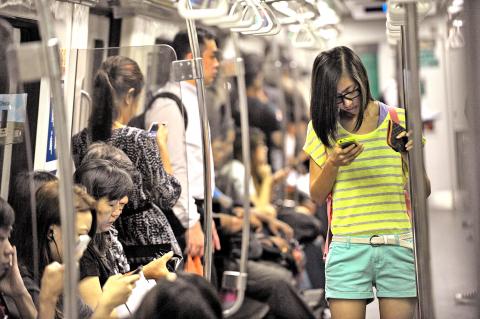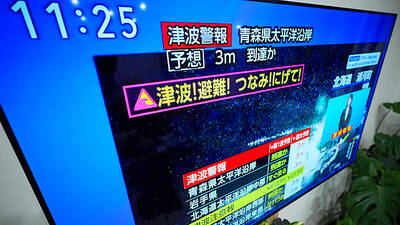Easily distracted? Cannot be separated from your smartphone? Constantly checking your device for no real reason? Chances are you are an addict — and you may even need professional help.
Psychiatrists in Singapore are pushing for medical authorities to formally recognize addiction to the Internet and digital devices as a disorder, joining other countries around the world in addressing a growing problem.
Singapore and Hong Kong top an Asia-Pacific region that boasts some of the world’s highest smartphone penetration rates, according to a report last year by media-monitoring firm Nielsen.

Photo: AFP
About 87 percent of Singapore’s 5.4 million population own smartphones.
In the US, where there are similar concerns about the impact of smartphones on society, a 65-percent penetration rate would not even make the top five in Asia Pacific.
Singaporeans also spend on average 38 minutes per session on Facebook, almost twice as long as Americans, according to a study by Experian, a global information services company.
Adrian Wang, a psychiatrist at the upmarket Gleneagles Medical Center, said digital addiction should be classified as a psychiatric disorder.
“Patients come for stress anxiety-related problems, but their coping mechanism is to go online, go onto social media,” Wang said.
He recalled having treated an 18-year-old male student with extreme symptoms.
“When I saw him, he was unshaven, he had long hair, he was skinny, he hadn’t showered for days, he looked like a homeless man,” Wang said.
The boy came to blows with his father after he tried to take away the young man’s laptop computer.
After the father cut off Internet access in the house, desperation drove the boy to hang around neighbors’ homes trying to get a wireless connection.
He was eventually hospitalized, put on antidepressants and received “a lot” of counseling, Wang said.
“We just needed to break the cycle. He got better, he was discharged from the hospital and I saw him a few more times and he was OK,” Wang added.
Tan Hwee Sim, a consultant psychiatrist at The Resilienz Mind clinic in Singapore, said that the symptoms exhibited by her young adult patients have changed over the years.
Obsession with online gaming was the main manifestation in the past, but addiction to social media and video downloading are now on the uptrend.
“Internet addiction as a disorder is not even listed in our latest psychiatric manual, it’s only listed in the appendix as a disorder that requires further study,” she said.
In terms of physical symptoms, more people are reporting “text neck” or “iNeck” pain, according to Tan Kian Hian, a consultant at the anesthesiology department of Singapore General Hospital.
“It is a commonly observed phenomenon that many people have their heads lowered and are now using their mobile devices constantly on the go, while queuing or even crossing the roads,” Tan said.
Singapore’s problem is not unique, with a number of countries setting up treatment centers for young Internet addicts, particularly in Asia, where South Korea, China and Taiwan have moved to tackle the issue.
In South Korea, a government survey last year estimated that nearly 20 percent of teenagers were addicted to smartphones.
China already has an estimated 300 Internet addiction centers, according to a report on state broadcaster CCTV’s Web site in February. It also cited a survey showing there may be more than 24 million young Chinese addicted to the Internet.
In Singapore, there are two counselling centers — National Addictions Management Services and Touch Community Services — with programs for digital addiction.
Trisha Lin, an assistant professor in communications at the Nanyang Technological University, said younger people face a higher risk because they adopt new technology earlier — but cannot set limits.
Lin defined digital addiction by a number of symptoms: the inability to control craving, anxiety when separated from a smartphone, loss in productivity in studies or at work, and the need to constantly check one’s phone.
Lin said that parents should avoid giving their children a smartphone or tablet computer to keep them quiet.
“It’s like the TV in the past with the babysitters and now it’s even worse, because now you have the screen with you everywhere,” she said, citing the case of a Taiwanese high-school student who could only sleep clutching her smartphone in case someone tried to call her.
A group of undergraduates from Singapore’s Nanyang Technological University launched a campaign late last year encouraging the public to put their smartphones in a face-down position when they are with loved ones.
The “Put it on Friend Mode” campaign drew strong support from students, said Chan Jing Hao, one of the organizers, and there are plans to expand the campaign to schools.
Addiction is so pervasive in Singapore that a “cyberwellness” education program for pre-school children — and their parents — is set to be launched in the second half of this year.
Chong Ee Jay, an assistant manager at Touch Community Services, which is launching the drive, said: “We want to give [the parents] a warning to not give these gadgets so early — and learn to withhold them.”

PARLIAMENT CHAOS: Police forcibly removed Brazilian Deputy Glauber Braga after he called the legislation part of a ‘coup offensive’ and occupied the speaker’s chair Brazil’s lower house of Congress early yesterday approved a bill that could slash former Brazilian president Jair Bolsonaro’s prison sentence for plotting a coup, after efforts by a lawmaker to disrupt the proceedings sparked chaos in parliament. Bolsonaro has been serving a 27-year term since last month after his conviction for a scheme to stop Brazilian President Luiz Inacio Lula da Silva from taking office after the 2022 election. Lawmakers had been discussing a bill that would significantly reduce sentences for several crimes, including attempting a coup d’etat — opening up the prospect that Bolsonaro, 70, could have his sentence cut to

A powerful magnitude 7.6 earthquake shook Japan’s northeast region late on Monday, prompting tsunami warnings and orders for residents to evacuate. A tsunami as high as three metres (10 feet) could hit Japan’s northeastern coast after an earthquake with an estimated magnitude of 7.6 occurred offshore at 11:15 p.m. (1415 GMT), the Japan Meteorological Agency (JMA) said. Tsunami warnings were issued for the prefectures of Hokkaido, Aomori and Iwate, and a tsunami of 40cm had been observed at Aomori’s Mutsu Ogawara and Hokkaido’s Urakawa ports before midnight, JMA said. The epicentre of the quake was 80 km (50 miles) off the coast of

China yesterday held a low-key memorial ceremony for the 1937 Nanjing Massacre, with Chinese President Xi Jinping (習近平) not attending, despite a diplomatic crisis between Beijing and Tokyo over Taiwan. Beijing has raged at Tokyo since Japanese Prime Minister Sanae Takaichi last month said that a hypothetical Chinese attack on Taiwan could trigger a military response from Japan. China and Japan have long sparred over their painful history. China consistently reminds its people of the 1937 Nanjing Massacre, in which it says Japanese troops killed 300,000 people in what was then its capital. A post-World War II Allied tribunal put the death toll

A passerby could hear the cacophony from miles away in the Argentine capital, the unmistakable sound of 2,397 dogs barking — and breaking the unofficial world record for the largest-ever gathering of golden retrievers. Excitement pulsed through Bosques de Palermo, a sprawling park in Buenos Aires, as golden retriever-owners from all over Argentina transformed the park’s grassy expanse into a sea of bright yellow fur. Dog owners of all ages, their clothes covered in dog hair and stained with slobber, plopped down on picnic blankets with their beloved goldens to take in the surreal sight of so many other, exceptionally similar-looking ones.